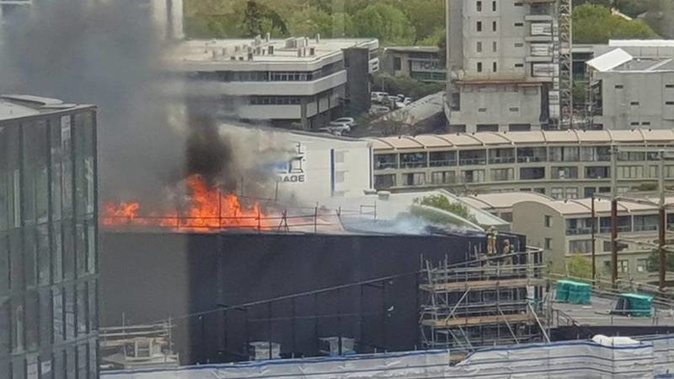
An insurance expert says insurers on SkyCity's new convention centre site may refuse to pay out on this week's fire on the grounds that it was caused by "recklessness or gross irresponsibility".
Rohan Havelock, a senior lecturer in insurance law at the University of Auckland, said the lead contractor Fletchers, a subcontractor and even an individual employee of the subcontractor could all potentially be held liable for the damage.
But any small subcontractor, and certainly its employee, was unlikely to have the funds to pay for potentially many millions of dollars worth of damage, so any litigation was likely to be aimed primarily at Fletchers.
SkyCity and Fletcher Building confirmed yesterday that contract works and third-party liability insurances were in place on the $700 million convention centre project.
SkyCity chief executive Graeme Stephens said SkyCity's insurer was an international company.
"We're comfortable with the credibility of the insurer and their ability to meet their obligations," he said.
Havelock, who also works in private practice on insurance contracts but has not seen the contracts for the convention centre project, said contract works policies normally included a schedule listing all the subcontractors who were covered.
Most subcontractors also had public liability insurance covering any damage they caused to third parties.
But he said: "The main issue is that a contract works policy and a public liability policy in general will almost always contain a 'reasonable care' or 'reasonable precautions' clause, which requires the insured to take reasonable care to protect the contract works."
He said a recent High Court case had set a high bar for breaching that clause.
"For the condition to be not complied with you need more than just carelessness, you need recklessness or gross irresponsibility," he said.
"For example, where the insured - the subcontractor, assuming they are covered - knows there was a risk but chose to disregard it, or where the risk should be so obvious to the ordinary person as to be inescapable.
"If the subcontractor was doing work with a blowtorch and he or she left it unattended, my view would be that that probably does amount to recklessness or gross irresponsibility, just because of the immediate risk of damage."
Havelock said the insurer would then refuse to pay out.
"That would lead to a situation where Fletchers is uncovered, and if it was sued by SkyCity it would be liable to pay out of its own pocket," he said.
He said contract works and public liability policies often included specific conditions relating to "hot work" such as cutting, grinding or using blowtorches.
"For example, work must be carried out under supervision of a foreman, you must adequately protect surrounding works against fire, and it may also say that any lighted or heated equipment will not be left unattended," he said.
"Assuming it's a case of a worker leaving a blowtorch unattended, there is a very high likelihood that such a condition is not complied with, and you are looking at a situation where the subcontractor is not insured, and therefore if it's sued, and we are talking about multi millions of dollars, if it can't pay the judgment, then we are looking at insolvency."
He said he would expect SkyCity to sue both Fletchers and the subcontractor, or if it sued only Fletchers then Fletchers would be likely to join in the subcontractor as an additional party.
"So we are potentially looking at both parties being found liable," he said.
"Then it would be a question of who SkyCity can actually enforce against, so I would think that Fletchers is primarily in the firing line as the party with the deeper pockets."
He said Fletcher's liability might be limited if the court apportioned responsibility between it and the subcontractor, but he believed the court was unlikely to find that Fletchers had no responsibility.
"If Fletchers was found to be not liable, which I think would be very unlikely, then yes, SkyCity would not be able to recover [its losses]," Havelock said.
"In a worst-case judgment against the subcontractor, and the subcontractor can't pay or can't pay very much, then essentially SkyCity is left with a loss. That would be a worst-case scenario for SkyCity and I think that is very unlikely.
Take your Radio, Podcasts and Music with you









